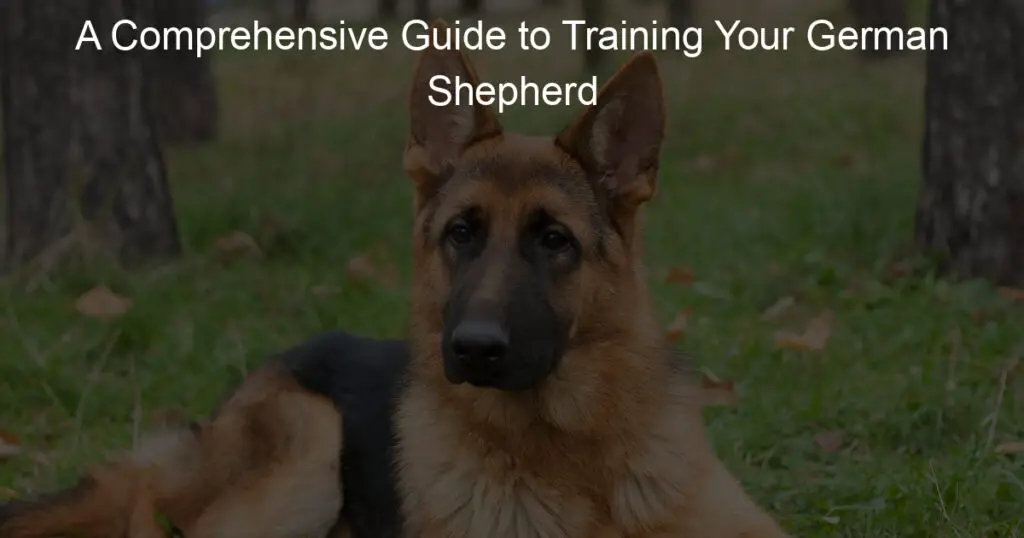Are you ready to embark on the rewarding journey of learning how to train a German Shepherd? With their intelligence, loyalty, and bravery, these wonderful dogs are capable of accomplishing great feats. In this comprehensive guide, we’ll explore the essentials of German Shepherd training, from understanding their needs to advanced techniques for working dogs. Let’s dive into the exciting world of how to train a German Shepherd and unlock your dog’s full potential!
Short Summary
- Understand your German Shepherd’s needs and start early with puppy training, focusing on socialization, crate training, and basic obedience commands.
- Advanced techniques involve hand signals, combining commands & practicing stay/come out of sight. Tackle common behavioral issues with help from professionals.
- Consistency & patience are essential for successful dog training. Seek professional help when needed & use resources to ensure success.
Understanding Your German Shepherd’s Needs
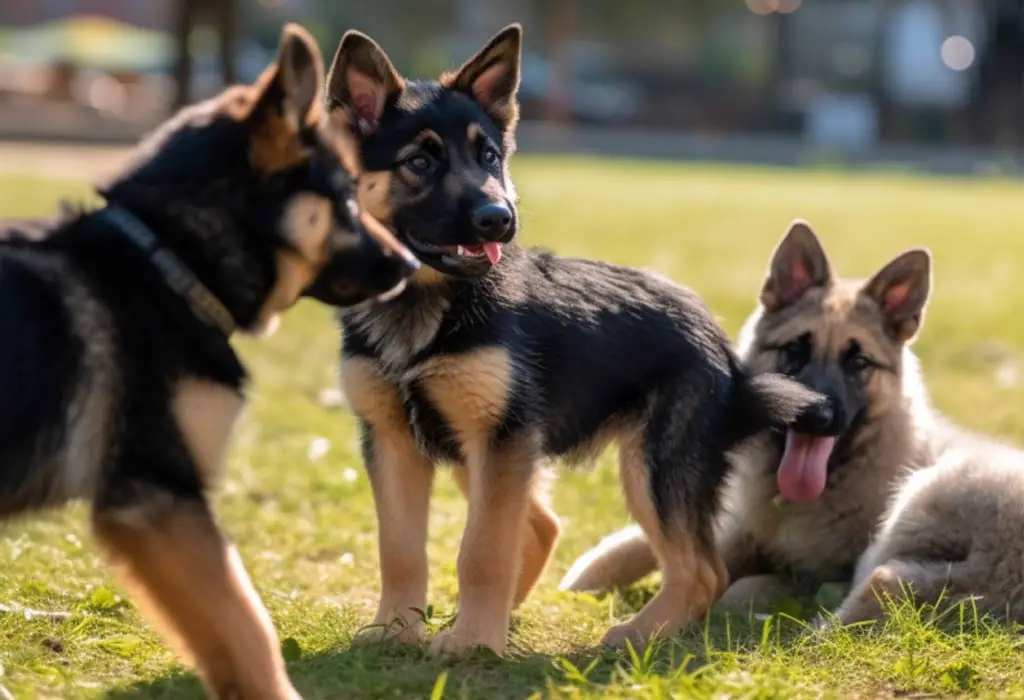
German Shepherds were originally bred to herd sheep and protect them from potential predators. These intelligent, loyal, and brave dogs have evolved over time to serve various roles, from police dogs to faithful companions. Understanding your German Shepherd’s needs is essential for successful training.
One of the key aspects of German Shepherd training is recognizing their need for exercise and mental stimulation. German Shepherds require a minimum of two hours of exercise daily, divided into multiple sessions. Mental stimulation is equally important, as these intelligent dogs thrive on challenges and learning new tasks. This combination of physical and mental engagement helps create a strong bond between you and your dog, making training more effective.
A strong leader is crucial when training a German Shepherd due to their pronounced guarding instinct. Establishing yourself as a confident and assertive leader enables your dog to differentiate between safe, questionable, and dangerous situations. Proper socialization, starting at a young age, is also essential to prevent bad habits and ensure your German Shepherd is comfortable around other dogs and people.
Leash training is another important aspect of German Shepherd training. Introduce the leash gradually and rewarding your dog with treats will help establish proper leash manners, ensuring your dog walks comfortably by your side. With consistency and patience, your German Shepherd will become a well-rounded and obedient companion.
Starting Early: Puppy Training Essentials
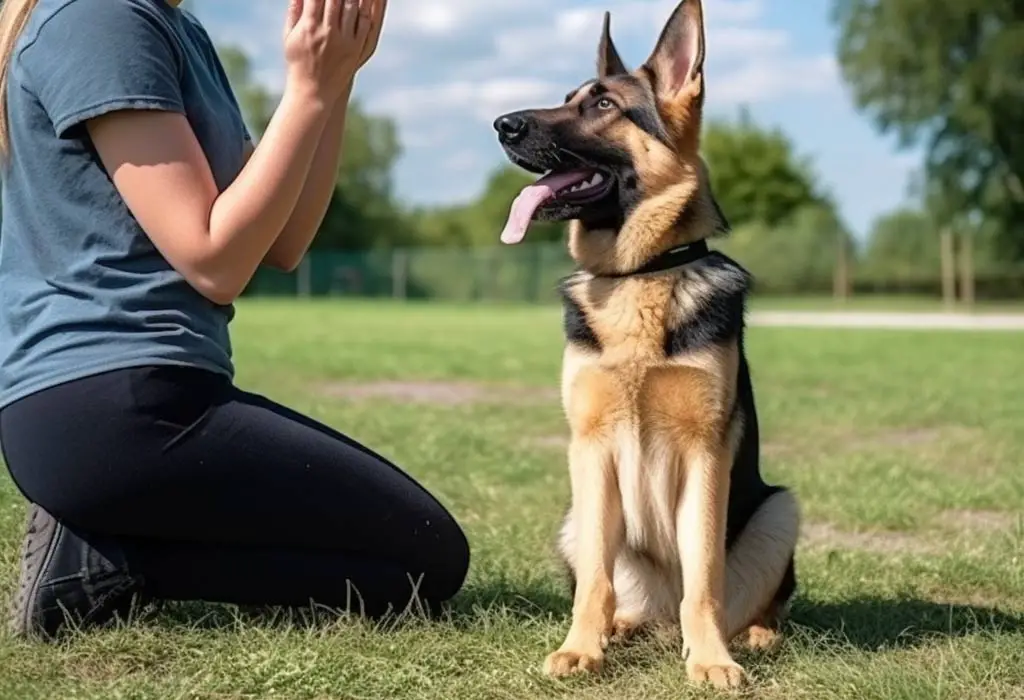
The moment you bring your German Shepherd puppy home is the perfect time to start their training journey. Early training serves as a foundation for more rigorous and concentrated training in the future. Focusing on socialization, cage training, and basic obedience commands to begin training with will set your puppy on the path to success.
Let’s explore these essential training components in more detail, starting with socialization for puppies, puppy obedience class followed by crate training basics, and finally, teaching basic obedience commands.
Socialization for Puppies
Socializing your German Shepherd puppy is a crucial aspect of their development. Proper socialization helps minimize guarding drive and fosters confidence in your dog. It is recommended to begin socializing a German Shepherd puppy between 12 and 16 weeks of age.
To ensure successful socialization, be patient and introduce new things gradually and in a positive manner. Reward desirable behavior with treats and praise, remain calm and composed, and redirect attention if the pup appears nervous. Establishing a socialization routine and considering enrolling in puppy classes can also greatly benefit your German or Shepherd pup.
Expose your puppy to a variety of new experiences, such as different surfaces, auditory stimuli, and a broad selection of aromas. Meeting new people and other dogs in a controlled environment will help your German Shepherd develop a well-rounded temperament and become a confident, well-adjusted adult.
Crate Training Basics
Crate training is an essential component of the German Shepherd puppy and training program. Contrary to misconceptions, crate training is not a form of caging your dog. Instead, it provides your puppy with a comfortable den to call their own. An adjustable cage is recommended for German Shepherds. Crate training can be beneficial in the potty training process, as dogs are generally disinclined to soil their sleeping area.
Consistent supervision and maintaining consistency in your dog’s routine are also essential elements of successful house training. When crate training your German Shepherd puppy, start by introducing the cage gradually and positively, using treats as rewards. Over time, your puppy will become comfortable entering the cage and view it as their safe space, which can help reduce the potential of separation anxiety.
Basic Obedience Commands
Teaching your German Shepherd basic obedience commands is a fundamental aspect of their training. Commands such as “sit,” “lie down,” and “stay” ensure your dog’s safety and help maintain control in various situations. German Shepherds are smart and eager learners, so with patience and consistency, your dog will quickly master these basic commands too.
To teach the “sit” command, use the “lure” technique with a treat, guiding your dog into a sitting position and rewarding them with the treat. For the “come” command, say your dog’s name and “come,” rewarding them with a treat when they respond and come towards you. The “lie down” command can be taught once your German Shepherd has mastered the “sit” command.
Remember to do positive dog training and be patient and consistent in your training sessions. With time and practice, your German Shepherd will learn these important commands, becoming a well-behaved and obedient companion.
Advanced Training Techniques for German Shepherds
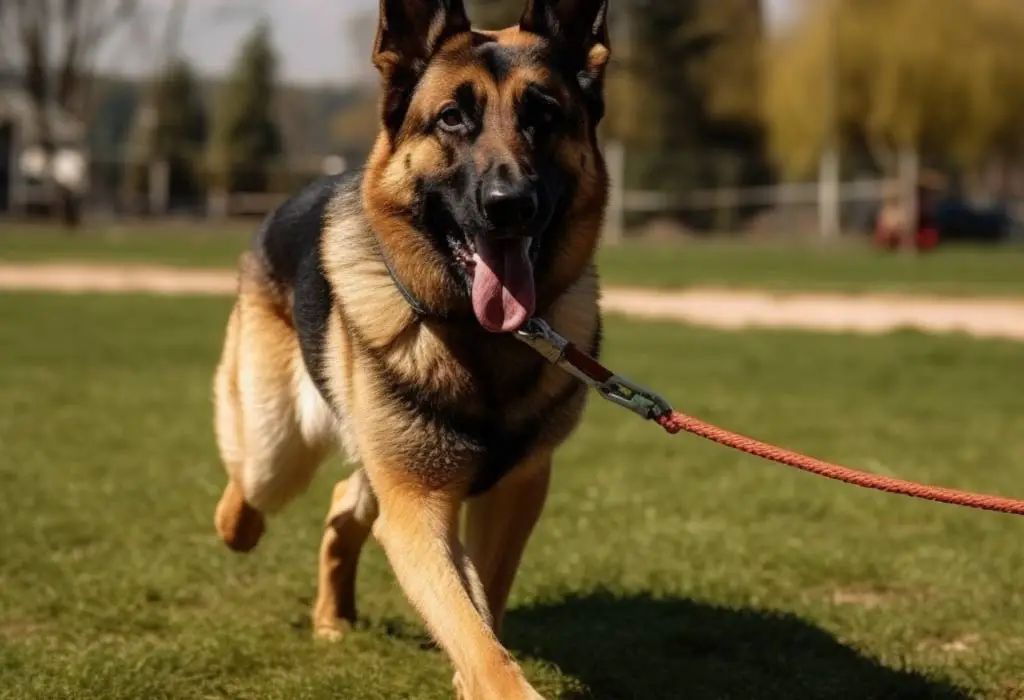
Once your German Shepherd has mastered the basics, it’s time to introduce advanced training techniques. These techniques encompass teaching hand signals, combining commands, practicing stay and come with the owner out of sight, and training the dog to decline treats.
Hand signals are silent commands that can be particularly useful in situations where verbal commands might not be heard or understood. Combining commands teaches your dog to perform multiple tasks simultaneously, increasing their mental stimulation and overall obedience. Practicing stay and come with the owner hidden is an excellent way to test your dog’s ability to obey commands even when you are not visible.
When introducing advanced training techniques, remember the importance of giving your German Shepherd plenty of rest time and keeping tough training sessions short. Balancing work and rest will ensure your dog remains eager to learn and avoids burnout.
Tackling Common Behavioral Issues
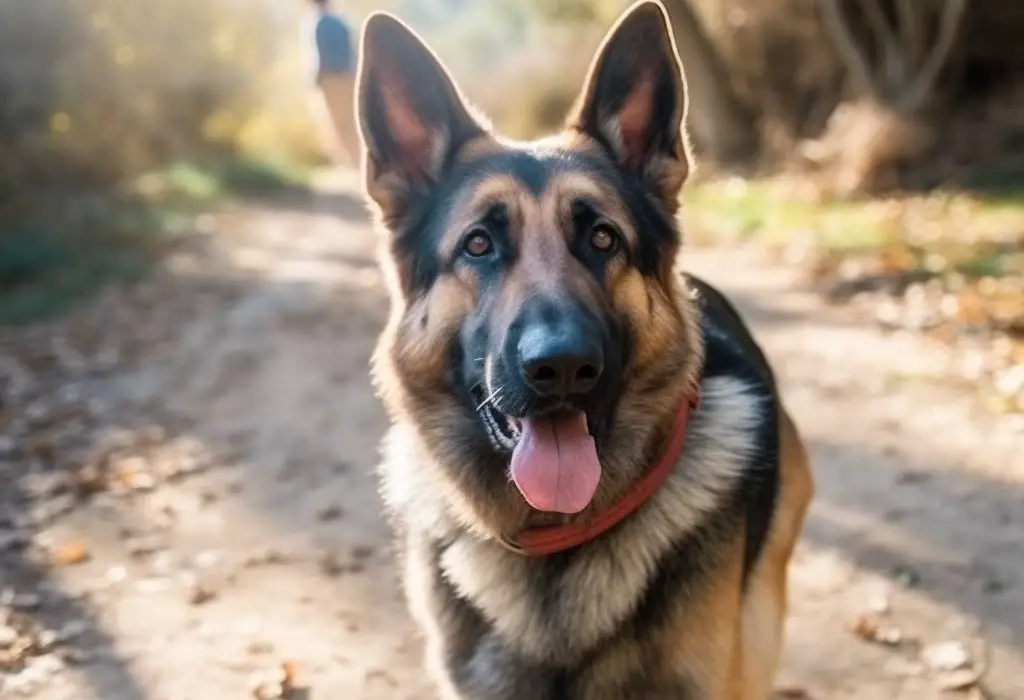
German Shepherds, like all dogs, can exhibit common behavioral issues such as resource guarding, biting, and separation anxiety. Early training and guidance from professional organizations like the ASPCA can help manage these issues and prevent them from escalating.
To prevent resource guarding in German Shepherd puppies, engage in “fetch and drop” games and make handling and brushing a pleasant and rewarding experience. Separation anxiety can be prevented through early crate training and gradually increasing the time your dog spends alone, starting with a few minutes and increasing to longer periods.
Addressing these common behavioral issues early on ensures your German Shepherd develops into a well-behaved and well-adjusted adult, making them a joy to have as a pet parent a companion.
Specialized Training for Working German Shepherds
German Shepherds are often employed in specialized roles due to their intelligence, strength, and versatility. Specialized training for working German Shepherds may encompass police and military operations, search and rescue, herding, and competitive and obedience training.
When engaging in specialized training, it is imperative to ensure that your canine companion is provided with sufficient rest time. This type of activity can be quite taxing, and although your dog may enjoy the process, it is necessary that they are allowed to rest, recharge, and relax. Training sessions should be kept relatively short to prevent burnout and maintain your dog’s enthusiasm for learning.
Consistency and Patience: Keys to Successful Training
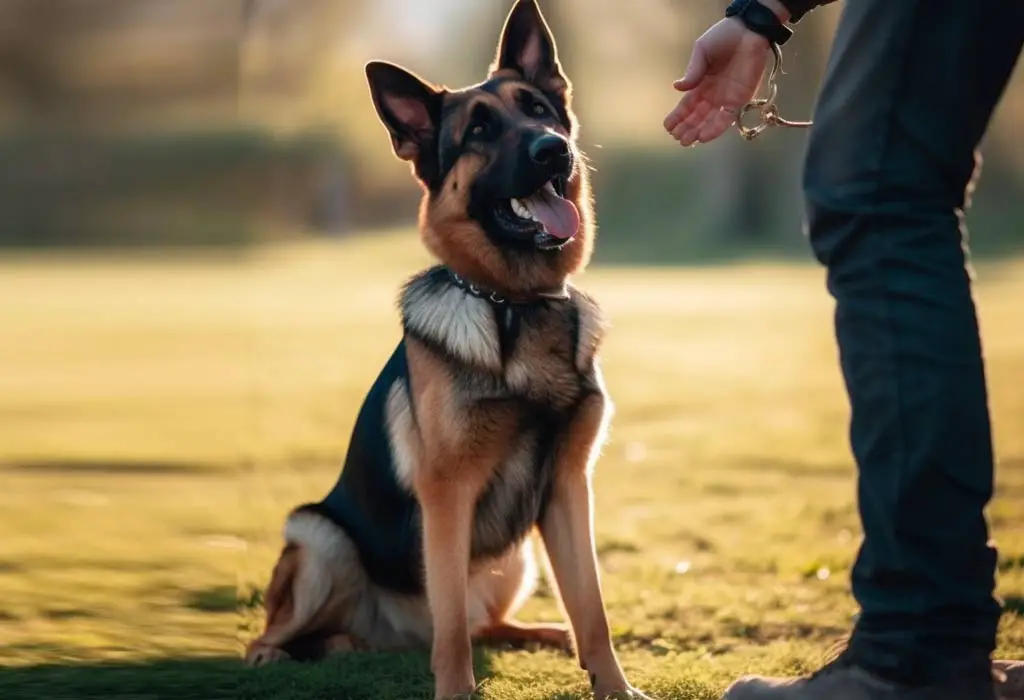
Consistency and patience are essential for successful training. By maintaining a consistent approach and exhibiting patience, you set the stage for a strong bond with your German Shepherd and lay the groundwork for effective training.
Using a clicker can improve communication and timing between you and your dog during training sessions. The clear, distinct sound of the clicker allows your dog to understand exactly when they have performed the desired behavior, making learning more efficient and enjoyable.
Incorporating training into daily activities is another key to successful training. Have your dog perform commands such as ‘down’ before playing tug, ‘down’ and ‘wait’ before feeding, and ‘sit’ and ‘wait’ at the door before going for a walk. By integrating training into everyday life, your German Shepherd will consistently practice and reinforce their learned commands.
When to Seek Professional Help
In some cases, it may be necessary to seek professional help when training your German Shepherd. If your dog displays aggressive or dangerous behavior, or if you are training your German Shepherd as a therapy dog, professional guidance may be beneficial.
When selecting a dog trainer, look for someone who has qualifications, uses positive reinforcement techniques, has prior experience with German Shepherds, is amiable and communicative, and is willing to address your inquiries. A qualified trainer can provide valuable insights and guidance to help you and your German Shepherd achieve your training goals.
Training Resources and Support
There are numerous resources available to assist you in training your German Shepherd. Books, websites, and apps offer a wealth of information on various training techniques and tips. When searching for training tips and resources, it is essential to choose reputable sources backed by professional organizations or experienced trainers.
Remember that training your German Shepherd should be an enjoyable and rewarding experience for both you and your dog. By seeking guidance from reputable sources and staying consistent and patient in your training approach, you will set the stage for a lifelong bond with your intelligent and loyal companion.
Summary
Throughout this comprehensive guide, we have explored the essentials of German Shepherd training, from understanding their needs to advanced techniques for working dogs. By focusing on early training, socialization, obedience commands, and recall training and addressing common behavioral issues, you will lay the foundation for a well-rounded, confident, and obedient German Shepherd.
Embrace the journey of training your German Shepherd with patience, consistency, and a sense of adventure. As you and your canine companion grow and learn together, you will forge an unbreakable bond that will last a lifetime. Now it’s time to embark on this exciting adventure and unlock your German Shepherd’s full potential!
Frequently Asked Questions
Are German Shepherds easy to train?
German Shepherds are renowned for their intelligence, loyalty and even basic obedience training, making them highly trainable dogs. If trained in a positive way with lots of patience and persistence, they can learn even complex commands without any problems.
Overall, German Shepherds are easy to train with the right guidance.
How many days does it take to train a German Shepherd puppy?
Training a German Shepherd puppy can typically take between 8 to 12 weeks. To achieve the best results, it is important for dog owners to start training early and maintain a consistent approach.
With dedication, reward-based training, and consistency, you can see the rewards of successful German Shepherd puppy training within just a few weeks.

